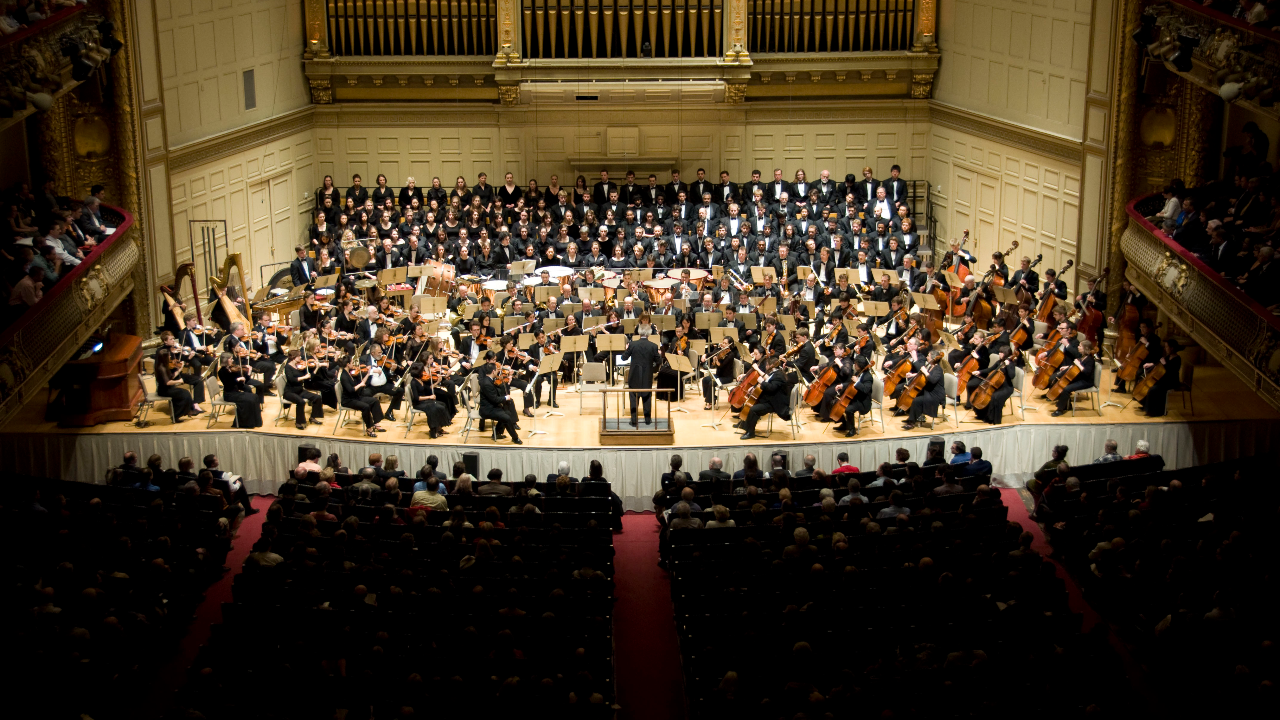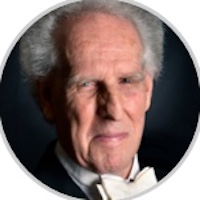The BPO and BPYO - 44th season!

Dear Friends of the BPO and the BPYO
As we head into our 44th season—and I approach my middle 80’s—I am excited to revisit many of the great works that have inspired me most over the decades. As ever, I’m drawn to engage with interpretative issues that have fascinated me throughout my professional life.
At the same time, I want to look forward by engaging with extraordinary soloists—many of whom are at the start of major careers—who will light up the world’s stages for years to come. Some may not be household names yet, but I am sure they will bring as much pleasure to you, our audience, as they have to me.
Opening night features Jonathan Biss, an extraordinary artist. He is already amongst the most respected musicians in America—but I wonder how many of you have heard him play live. Scion of one of the great American musical families, he is Co-Director with Mitsuko Uchida of the world-famous Marlboro Festival; and one of the most popular teachers on the internet, especially of Beethoven. Music lovers will not want to miss October 19th, when he performs the lyrical and “heavenly” Fourth Piano Concerto of Beethoven. It is a rare opportunity to hear this supremely sensitive artist probe deeply into one of Beethoven’s most ethereal works.
In the second half, we turn to a glorious symphony representing the last great flowering of Russian romanticism, Rachmaninoff’s Second. This vast and gripping work is perfectly suited to the acoustics of Symphony Hall, which will display its opulent orchestration as no other hall in the world can. Rachmaninoff composed it in a white heat, and you can be sure that we will bring to it the same fervor.
In the second concert, you will hear two masterpieces that are not just close to my heart, they are deep within my eighty-three-year-old being: Dvorak’s Cello Concerto and Brahms’s Second Symphony. “Brahms Two” is the first symphony I ever conducted, as I made my way from the cello to the podium. The year was 1972—November, Jordan Hall—fifty years ago exactly. I return often to this great work, continuing a conversation I began with it five decades ago. The piece has taught me much about intricate and subtle aspects of timing, and about the possibilities of intimate musical dialogue in an orchestra, because of the work’s chamber music textures. To give you an idea of what I mean, you can hear me coach a single cellist in a passage from the slow movement in an Interpretation Class here.
Now imagine all the cellists of the BPO playing that gorgeous melody altogether!
The Dvorak Cello Concerto stands supreme amongst all cello concertos. It was my constant companion as a young cellist. My first encounter with it as a conductor was with a gifted young cellist at Harvard who was just about to become “Yo-Yo Ma!”
Now I have found another super-star-to-be, Hayoung Choi. How did I find her? Well, she found me actually, by winning the Queen Elizabeth Competition. You can do what I did: listen to her breathtaking performance of the Lutoslawski Concerto in the competition’s final round, after which she was the unanimous choice of the judges for the Gold Medal. I have rarely heard anything so mesmerizing. You will understand why the very next day we invited her to perform with the BPO. She will come to us directly from touring in her native Korea with, yes, the Dvorak Concerto. This is going to be a love-in!
The third concert is Beethoven’s Ninth. It remains, after two hundred years, music’s ultimate affirmation of the humanity that lies within us all. I have wrestled with this work for over forty years, always asking the question: “What did Beethoven really intend?” I have made two commercial recordings, one with the BPO, the other with the Philharmonia Orchestra of London, in which I attempt to provide a literal answer to that question. Now, at this point in my continuing journey with this masterpiece, I feel free to bring my own instincts to the stage. The BPO returns to Symphony Hall on February 24th —and two days later to Carnegie Hall—to perform my newly liberated interpretation of the work.
As always, our choices will be guided by Beethoven’s precise instructions, but this time I want to add the slight tempo modifications that we know Beethoven used in his own performances, nuances that worked so beautifully in last season’s performance of the Eroica. Please attend my pre-concert lecture—6.45 P.M. in Boston; 1 P.M. in New York—in which I will explain this new approach and what it reveals about the meaning of the work.
The final BPO concert consists of two of the most profound works in the Romantic repertoire, Schubert’s Unfinished Symphony and Mahler’s heart-wrenching symphony in song, Das Lied von der Erde. Dame Sarah Connolly, one of the world’s leading mezzo-sopranos, appears on my recording of Mahler’s Second with the Philharmonia. Listen to her meltingly beautiful rendition of “Urlicht” which in my opinion has never been so eloquently sung.
Stefan Vinke, one of Bayreuth’s leading Heldentenors—who sang so unforgettably the role of Siegfried with the Boston Philharmonic Youth Orchestra in 2015—will sing the ecstatic tenor solos. If you listen to these two singers in these short excerpts you will undoubtedly be compelled to attend the concert on April 14th to hear them live.
The Boston Philharmonic Youth Orchestra, still glowing from its triumphant and hugely rewarding tour of Greece, sets out on its most challenging and thrilling year to date.
The season begins with Beethoven’s Fifth Symphony and Strauss’s Ein Heldenleben, twin peaks from the 19th and 20th century orchestral repertoire. If you are wondering whether a youth orchestra of young musicians aged 12 to 21 can scale such monumental heights, you obviously haven’t heard them play. Give them a chance; add them to your list of “Must Hear” musical organizations. I promise that you will be deeply moved.
Music critic Jonathan Blumhofer, in his wrap-up of the Greek tour, wrote of the recent tour repertoire:
“Taken together, then, these pieces functioned at an extremely high interpretive level. Indeed, each tour concert was a profoundly fulfilling artistic statement from Ben Zander and the orchestra, as meaningful as any you’d expect from a top-tier ensemble at home in London, Paris, Boston, or Los Angeles.”
The violin soloist depicting the hero’s wife in Ein Heldenleben will be Eric Chen, who rendered the devilish solos in Mahler’s 4th so bewitchingly on the recent tour to Greece.
Listen to the first three minutes of BPYO playing the opening of Ein Heldenleben from the first tour to Holland when the orchestra was founded eleven years ago.
For the second concert the “soloist” will not be out in front of the orchestra. It will be the members of the orchestra itself, many of whom are undoubtedly destined for important careers in music. The orchestra performs that ultimate test of an orchestra’s virtuosity and artistry: Bartok’s Concerto for Orchestra. When the Boston Symphony gave its premiere in 1943, we know that it posed a great challenge for the orchestra. Now see how natural it is for their musical great-grandchildren.
The Concerto for Orchestra is always the final work on any program, but for the BPYO, another towering work concludes the concert: Tchaikovsky’s deeply emotional Fifth Symphony. As an introduction to symphonic music for young people—perhaps attending their first orchestral concert—I cannot imagine a more perfect program. Invite all the young people you have in your life to hear this performance by the amazing members of the BPYO. It will turn them into music lovers forever.
The final program is Mahler’s Second Symphony, “Resurrection,” on May 3rd. We took it on tour the first year of the orchestra’s existence, eleven years ago. Listen to the opening of the first movement, in our performance from Rotterdam.
No work in the repertoire is closer to my heart than Mahler’s Second, and I deeply relish the opportunity to pass on my passion for this monumental work to the young musicians of the Boston Philharmonic Orchestra, knowing that their lives will be changed by the experience.
Plans are still being worked out, but it seems that taking the orchestra on tour to South Africa in June, something we were very close to doing just before Covid, is a definite possibility.
What a year!
Each BPO concert will be preceded by my comments about the works and our interpretation of them. These pre-concert talks are designed to help you get as much as possible out of the performance. They are an intrinsic part of the BPO experience. Many audience members—even those with little or no experience—report that these talks provide an immediate and deeper engagement with the works performed. The talks are now available on the new website www.BenjaminZander.org, along with BPO and BPYO performances, Interpretation Classes, and much, much more.
We look forward to seeing you for a season overflowing with some of the greatest treasures symphonic music has to offer. I guarantee you will be moved, engaged, and astonished. I can’t wait!
Best wishes,
Benjamin Zander
 Benjamin Zander
Benjamin Zander